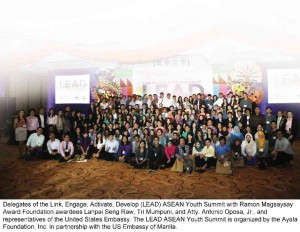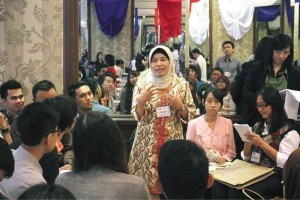Leading toward a true Asean connection

BELIEVING IN THE YOUTH (From left) Ayala Foundation president Maria Lourdes Heras-de Leon, Ayala Corp. CEO Jaime Augusto Zobel de Ayala, Bureau of East Asian and Pacific Affairs exec Susan Stevenson, US Ambassador to Asean David Carden and US Embassy official Bettina Malone
With natural and man-made crises becoming regular occurrences in different parts of the world, educating the youth to better deal with catastrophes seems to be a good strategy for the future.
But Ramon Magsaysay Award winner Tri Mumpuni of Indonesia does not think modern education is doing an adequate job of preparing the young for their future responsibilities.
“Modern education is creating a youth generation that thinks mainly of industrial and financial concerns,” Mumpuni told the Inquirer during the opening recently of the three-day Lead Asean Youth Summit organized by Ayala Foundation in partnership with the United States Embassy.
“They train their logic on capital accumulation, market expansion and profit maximization” but they remain “rather short on empathy,” said Mumpuni, who received the Ramon Magsaysay Award in 2011 for harnessing micro-hydropower to empower the poor in Indonesia.
Mumpuni said the youth had developed a mindset focused on finding their comfort zone, instead of thinking about how to help the less privileged. She expressed the view that this was a product of today’s education system.
Article continues after this advertisement‘Me’ generation
Article continues after this advertisement“[Students would say,] ‘I don’t care; once I graduate, I just need to have a good job, an expensive house, nice cars and a good-looking wife or husband…’ (But) that’s what we don’t want you to do,” she told the 150 delegates from 10 member countries of the Association of Southeast Asian Nations (Asean).
Brunei, Cambodia, Indonesia, Laos, Malaysia, Burma (Myanmar), Singapore, Thailand and Vietnam had 10 representatives each while host Philippines had 60.
Changing the materialist approach to life would require a tenuous balance between thinking and feeling, Mumpuni said. In making decisions, one should use both mind and heart.
“If you make a decision just by thinking and without feeling, be careful—you may be suffering from EDHD,” she said, as the crowd burst into laughter.
She added, “A telling symptom of EDHD is becoming self-important, not caring about other people.” EDHD, which Mumpuni coined, stands for empathy deficiency human disorder.
But she reassured her audience of young people in their 20s, “I don’t think this group has EDHD.”
The summit participants were considered to be their nations’ future movers and shakers who, at a young age, were already aware that they could do something for their countries and their communities.
All the delegates were either alumni of US government exchange programs or of the Ayala Young Leaders Congress. Every one had demonstrated a passion for making a difference, one
project at a time.
Reading’s power
Filipino Anne Mimille Guzman, 20, said she believes in the “transformative power of reading.” Cofounder of the family ministry and psychosocial support group House of Treasures, she visits the cancer ward of the Philippine General Hospital where she feeds and reads books to children waiting for their chemotherapy sessions. The group also holds art therapy and workshops for the kids.
“The summit has been instrumental in bringing about a true Asean connection … I’ve learned how, as a region, we can find strength in our beautifully rich and diverse cultures,” said Guzman, who wrote the children’s book, “Clara’s Coffee and other Tales,” the second Filipino book after “Noli Me Tangere” to be translated into Braille.
“I’ve learned to unlearn, listen and grow as a leader,” she said.
Guzman and the other delegates listened to Mumpuni and two other Magsaysay laureates, Lahpai Seng Raw of Burma and Antonio Oposa of the Philippines, during the panel discussions. They saw advocacy in action through exposure trips and other activities, which they uploaded on Facebook, Instagrammed and tweeted, making the hashtag #youth4asean a trending topic on Twitter.

DELEGATES from the 10 Asean countries huddle up as a “borderless barkada” for the three-day Lead Youth Summit, a project of Ayala Foundation and the US Embassy that is geared toward building a strong network of young leaders in the region.
But Lead Asean Youth Summit was really about the delegates learning more about their neighboring countries, their cultures and the challenges they face and how the youth can help address them, keeping in mind Asean 2015 when the region will become virtually borderless.
As the youth of Southeast Asia forge ties and live their passion out, US President Barack Obama himself assured the young leaders of the United States’ support.
“We’ll join with extraordinary young men and women like you on the things you care about most. … We’ll give more young people the opportunity to pursue quality education in your countries … and to study in America. We’ll deepen ties between us with new trainings and exchanges,” Obama said in his video message for the summit delegates as he announced a new US effort, the Young Southeast Asian Leaders Initiative.
“Your generation is going to define the Asia-Pacific for decades to come. And I’m excited about the progress we can make together,” he also said, adding that he’ll meet with the young leaders who are part of the initiative when he visits the region in April.
For 25-year-old Malaysian Fareeza Ilyana, it was an enlightening and inspiring trip. She could not forget the story of a 24-year-old Thai delegate who, in a visit to a rural area in northern Thailand, met children who could not read. He realized it was because they could not relate to the instructional media available.
“He started learning via YouTube how to hand-stitch books using recycled materials. Enlisting a friend who could illustrate, he ‘localized’ Shel Silverstein’s “The Giving Tree.” [The] apple tree became a mango tree (there were many mango trees in northern Thailand) and the boy [got] a Thai name,” Ilyana said.
After several hours of hard work and many needle pricks, he had hand-stitched over a hundred books, which were delivered to the village—in true “Giving Tree” spirit of giving unconditionally, Ilyana said.
“After the summit, I’m looking at replicating [his] idea in Malaysia. I would like to create lesson plans unique to Malaysian children,” she said, adding that her biggest dream was to build a school in Malaysia for children from disadvantaged backgrounds.
When her dream school is finally up, she vows to design curricula focusing on experiential learning and multiple intelligences, “not just memorizing what’s in textbooks,” she added.
